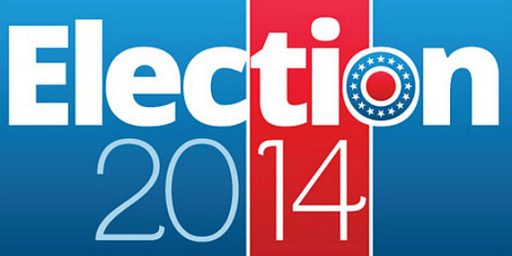Palin Loses AK Special Election
A Democrat will hold the seat until January at least.

Via the Anchorage Daily News: Democrat Mary Peltola wins special U.S. House election, will be first Alaska Native elected to Congress.
Democrat Mary Peltola was the apparent winner of Alaska’s special U.S. House race and is set to become the first Alaska Native in Congress, after votes were tabulated Wednesday in the state’s first ranked choice election.
Peltola topped Republican former Gov. Sarah Palin after ballots were tallied and after votes for third-place GOP candidate Nick Begich III were redistributed to his supporters’ second choices. Peltola, a Yup’ik former state lawmaker who calls Bethel home, is now slated to be the first woman to hold Alaska’s lone U.S. House seat.
What is striking to me about this is that it means a lot of Begich voters preferred a Democrat to Palin, which speaks to the ill-will she sowed when she quit the governorship to become a media personality.
This is just the special election to fill the remainder of the open term. November will be the contest to decide who gets the seat in January. Palin will be a candidate in that contest as well.
It is an outcome largely seen as an upset. Peltola would be the first Democrat to join Alaska’s three-person congressional delegation since U.S. Sen. Mark Begich lost reelection in 2014. And she defeated two Republicans to do so. Combined, Palin and Nick Begich III, nephew of Mark Begich and grandson of former U.S. Rep. Nick Begich, commanded nearly 60% of first-place votes.
[…]
Begich was the first candidate eliminated, after no other candidate exceeded the 50% threshold needed to win under Alaska’s ranked choice voting system. The second-choice votes of Begich’s supporters were then tallied in what is called an instant runoff. Only half of Begich’s voters ranked Palin second — not enough for her to overtake Peltola
Peltola had 39.7% of the first-choice votes to Palin’s 30.9%. In the instant runoff, Peltola ended up with 91,206 votes to Palin’s 85,987, or 51.47% to 48.53%. A small number of additional ballots have not yet been counted by election officials, likely not enough to change results.






It may be just one seat, and she may or may not succeed in holding it in November. But make no mistake: this is a political earthquake.
Peltola is the first Democrat to win this seat since 1972, when the original Nick Begich (the current one’s granddad) disappeared in what is believed to have been a plane crash.
Let me make this clear: Democrats do not win statewide special elections in ruby red states during a red wave year.
Honestly, tonight is the first time I have seriously considered that Dems might hold the House in November.
Seems like a win for RCV.
Tom Cotton is now deliberately lying in order to play to the sorts of people who find anything beyond basic arithmetic confusing:
This is similar to the gambit of Bruce Poliquin when he lost to Jared Golden in 2018 after coming out slightly ahead in the first round. They act as though only the first choice on a ranked-choice ballot should count, when in fact that would be disenfranchising voters. Just because a voter with a ranked-choice ballot puts a particular candidate in first place doesn’t mean they would have invariably voted for the same candidate on a traditional ballot; the fact that it’s ranked choice to begin with affects how people vote.
Unfortunately, that explanation wouldn’t make a good bumper sticker, so as usual Republicans have the messaging advantage.
I had a similar reaction. However the result may partly reflect voters’ and the candidates’ lack of familiarity with rank choice voting. The three candidates other than Peltola should have hammered one message all through the campaign: “No matter how else you vote, make sure you put Peltola at #4!” The Republican Party should also have done everything they could to encourage Palin and Begich voters to “swap preferences”, i.e. give their second votes to the other Republican. I didn’t read any reports that either was done. I expect they may get their act together better in November.
@Kylopod:
That’s not how it works, homie.
Whenever Democrats win red or swing contests unexpectedly in defiance of polls, it’s a locally unique one-off you shouldn’t read too much into. Because of [convoluted ballot referendum wording confused rural Kansas voters / New York City transplants flooded NY-19 post-pandemic / ranked choice made Palin unelectable]. No trend here, move along folks.
Whenever Democrats lose anything anywhere, it’s because they’re doomed by progressives, CRT, Defund The Police, woke tweets, Brandon’s unpoularity, and trans people’s refusal to stop existing. Red Tsunami 2022, duh.
This is very surprising, and does not bode well for Republicans.
Special elections tend to reflect the district they are held in, to have a flipped outcome like this is pretty unusual. Today will be an interesting day at RNC HQ.
I dip occasionally into Sarah Longwell’s Focus Group podcast. A couple of weeks ago she was in Alaska. What surprised her was the dislike among Republicans for Sarah Palin.
I’m not from Alaska, but why would you vote for someone to represent you in government who has demonstrated that representing you in government isn’t their priority?
@Scott:
It’s something that hasn’t really been examined up to now, in the years since she quit the governorship. She was actually quite popular in the state in 2008, even with all the negative press she was getting nationally. I also wonder how much her national branding as a talk-radio moron reflected what she’d been like as governor. I know she had an ethics scandal. But I get the sense that at one point she knew how to talk about local issues. Her Bridge to Nowhere lie/flip-flop on the 2008 campaign trail was an early example of her pissing off locals in the state to appeal to a national audience.
@Ken_L:
If you can’t have A, you’re next choice is B so don’t be surprised when B might win. Not understanding the ranked choice concept deeply doesn’t mean they don’t understand an ordered list. Many R voter only care about seeing that letter after a name – if they placed a D anywhere above an R, it was on purpose. For the Dem to have won, it means there was enough 1st, 2nd and 3rd “yeah, we’ll take her” to make it over the line instead of being 4th with no hopes.
Republicans need to come to terms with the fact that many, many people vote for them because of tribal loyalty. Once you stop making it a binary choice (“my team or nothing!!!”), they start losing badly across the board as people can express their true opinions on candidates and the party line. That’s why they scream ranked choice is evil; they know damn well it would mean they’d never win a Presidential election again and likely only hold one part of Congress.
@Kylopod:
I agree it is a big deal. I do, however, suggest a bit of caution in drawing too many conclusions, especially given the new voting rules and the need for parties and candidates to adapt. (Not to mention it was a special election to boot).
And let’s not forget that Alaska is a state wherein Lisa Murkowski was able to win the Senate contest in 2010 via write-in. It isn’t exactly an exemplar that can be used to draw national conclusions (there are more people in metro Birmingham, AL than in AK).
@Ken_L: This is an excellent point to take into consideration. The parties and candidates (and voters) will have to learn how to navigate the system.
I would note that N=1 for this system in AK, so it is hard to draw conclusions (though many will try).
I would hypothesize, however, that Palin’s popularity problems in the state can’t have helped her and that assuming exit polling was done, that we will see that in the data
@KM:
True. But I can guarantee that a lot of them did not understand/think through the strategic implications of their rankings.
A trivial matter, to be sure, but who the hell is doing Palin’s hair? Boris Johnson’s barber?
@Steven L. Taylor: Of course caution is always warranted and making overly broad generalizations is unwise.
However, Peltola ranked ahead of Palin in the primary too, I believe–so, in the last two turns at the ballot box, Peltola as a candidate came out on top both times. In a deep red state like Alaska, one would not expect that.
And, special elections typically reflect the district in which they are held due to low turnout (what was the turnout like? I haven’t been able to find this, and it is a significant consideration), but given Alaska’s district is the whole state, this might be an odd point of reference.
I know better than to make too much of this, but to me, special election results are a way to gauge the temperature of the electorate.
@CSK: She’s had that Pebbles Flintstone thing going for a while now.
ETA: got the elusive edit button/feature and couldn’t let it go to waste!
@Steven L. Taylor:
And?
Scenario: 10 people are voting for a restaurant to eat at. Name gets called out and hands are raised to vote – you get 3 choices and raise both hands if it’s your primary choice. 5 primary choices is automatic winner, otherwise it’s ranked choice of basic votes.
Steakhouse? 4 total people, 3 primaries.
Schwarma joint? 3 people, 1 primary.
Artisan coffeehouse? 9 people, 2 primaries.
Hot dog stand? 8 people, 4 primaries.
Vegan place? 2 people, no primaries
Artisan wins despite only 2 people really, really wanting to go there as first choice. Did anyone who wanted hot dogs or schwarma think strategy through when they used their second or third vote for coffeehouse? Nope, they were cool with it as an option and guess what, that’s what you got. You know the only one plotting strategy? Schwarma primary guy who *knows* it ain’t gonna happen unless he rigs the system. He’s the one thinking ahead how to get those votes while most diners will be like “yeah, my second choice got it. My choice still matters”
@KM: Also, the Tom Cotton version of “people are too dumb to understand the ramifications of ranked-choice voting” isn’t the winning message he thinks it is.
IMHO, of course.
@Ken_L:
Not according to the voters.
@Jen:
Absolutely. For instance, Scott Brown’s upset win in 2010 was a sign of the coming Republican landslide later that year. The same was true on the Democratic side in 2018 with Conor Lamb’s win in a very Trumpy district. (You might also consider Doug Jones’ victory in late 2017 a sign, though it’s easier to write that off due to the black swan event of Roy Moore being outed as child sexual predator.) These are always low-turnout events, which is part of what makes it possible for a Dem to win in a very red district/state, or vice versa; it’s generally harder to do that in a regular-schedule election even in a good cycle for one’s party. But correct me if I’m wrong, but I’m unaware of this happening during a wave election for the other party. It’s usually a strong sign of which voters are truly engaged.
Also, the attempt to blame this result on ranked choice overlooks one point: nobody expected this outcome. 538 gave Peltola a 14% chance of winning. That’s lower than their current estimate of the chances of Dems keeping the House (24%)!
@Steven L. Taylor:
I don’t think that example is as telling as you think it is. Murk still lost her primary to a Tea Partier, just like many other Republicans across the country. It’s true she was the only one to later beat that Tea Partier a write-in campaign, but she was the only one who even tried.
@Kylopod:
I think Scott Brown’s victory had something to do with the fact that people couldn’t stand Martha Coakley, who, it should be noted, also ran a lousy campaign.
@CSK:
While she did run a terrible campaign, there were other factors, such as the fact that his victory instantly took away the Dems’ filibuster-proof majority, imperiling the ACA from passing (and for several weeks after the election the pundits declared the bill dead). Also, Dem leadership (including Obama) ignored the race before it was too late. So it was kind of a perfect storm.
@Kylopod:
Possibly the worst campaign I’ve ever witnessed. She refused to stand outside shaking hands because it was too cold, and worse, she thought Curt Schilling was a Yankees fan.
In Red Sox Nation.
@CSK: Then they had the bright idea to nominate her for governor in 2014, enabling Charlie Baker to eke out a win.
I think it’s safe to say we’ll never see her as the nominee for office in MA (or anywhere) ever again.
@Kylopod:
It is an example of a highly unusual event, plain and simple.
@Kylopod:
My experience is older (1990s), but here’s what happened in Missouri in 1992. After a very nasty and very bitter Republican primary for Governor between Bill Webster and Roy Blunt, Democrats pretty much swept every statewide office (except for State Auditor, which wasn’t on the ballot). Sen. Kit Bond barely held onto his seat.
Newly elected Governor Carnahan appointed a lot of Democratic house and senate members to administration positions. These were then open seats and special elections were held to fill them, the first of which was held in Dec. 1992. The Republican won that Senate seat, opening up his House seat. That special election–which was in a Democratic but very Catholic district, was won by the Republican candidate. This happened over and over in 1993–one after another, Republicans won special elections in Democratic districts. By 1994, Republicans won the US House.
That the reverse seems to be happening here–that Democrats are either out-performing in special elections or winning seats that frankly they shouldn’t (like Alaska) is extremely interesting.
@Kylopod:
Last I heard, she’s corporate counsel for Juul e-cigs.
@KM:
It matters in terms of assessing outcomes.
Without any doubt, new rules and processes will take time to fully penetrate the minds of voters and political actors.
@Jen: Thanks for the info. It’s generally thought that 1994 was a turning point in terms of nationalization of local races. You could say it was the first “modern” midterm.
@Steven L. Taylor:
But I don’t think it illustrates that Alaska is too odd to draw inferences about what’s happening nationally. If anything, I think it largely followed the pattern that was happening across the country, given that Murk did get ousted in the primary. The fact that she was the only candidate to respond to her defeat with a write-in campaign doesn’t imply the state was necessarily going against the national grain.
@Kylopod: And my point, which sort of got buried on my trip down memory lane (sorry) was that we saw signs as early as right after the 92 election. I’m just not picking up that vibe this year, quite the opposite in fact.
@Jen:
Okay, that makes sense.
One additional point I’d make, which may seem obvious but I don’t believe I’ve seen addressed, is that with the pro-Republican skew in the House, I believe there is a significant chance we could see Dems win the House popular vote while Repubs gain control of the chamber. The last time there was a split between House PV and who came out in the majority was 2012, when Repubs retained the majority they had acquired in 2010 despite getting fewer votes than Dems nationally. What I’m talking about would be a step farther than that: the House changing hands despite the “losing” party getting more votes. I think that would be a real sign that Repubs screwed the pooch in this cycle, even though they’d get the power of House control with all the terrible consequences that entails. I think it would still fall roughly into the pattern of cycles like 1998 or 2002 where the president’s party uncharacteristically gained seats in the House.
@Jen:
Yes, Democrats have overperformed both their 2020 numbers and pre-vote polling expectations in all five special elections held post-Dobbs:
Old habits die hard though, when it comes to leaving behind the conventional Beltway wisdom and prevailing narratives.
@DK:
Also, it’s a clear shift from the pre-Dobbs special elections this year, in one of which the Republicans flipped a Dem-held seat won by Biden. This makes it even likelier Dobbs is the big factor here.
@Jen: “Also, the Tom Cotton version of “people are too dumb to understand the ramifications of ranked-choice voting” isn’t the winning message he thinks it is.”
As I see it, when Tom Cotten says “my voters are too stupid to exist in the real world,” it’s probably the only time he’s telling the truth.
We will see if the people are happy with how the ranked choice voting turned out when they vote again in November.
IIRC, it’s the same candidates. So this will be an interesting test. (Different electorate, of course, because special elections are special)
@Gustopher: Not to mention it was supposed to be top four, not top three (which changes the possibilities). November should likely be top four (and in the context of the general, not a special election).